
Scam Alerts
- Details
- Last Updated on Thursday, 03 March 2022 12:19
- Hits: 20770
BANK PHISHING SCAM
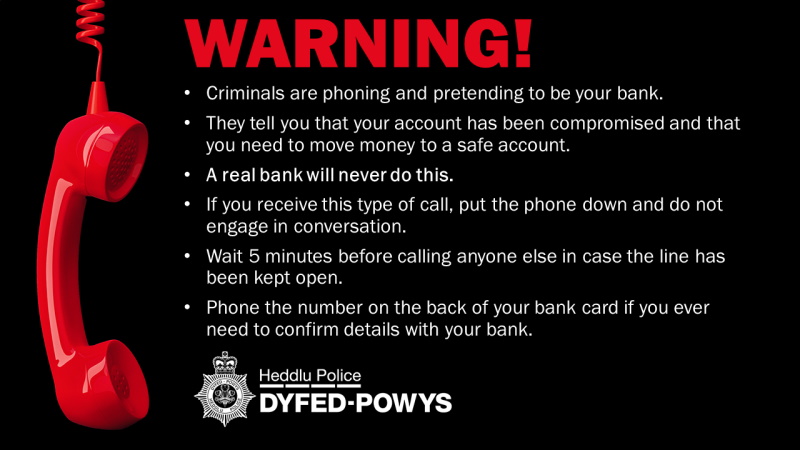
GIFT CARD SCAM
The following has been received from DC Gareth Jordan (Cyber Crime Team):
It would seem that Gift Card Emails are back on the agenda - we have had a few calls from colleagues in Pembrokeshire that people have been receiving emails requesting Gift Cards to be purchased.
Key signs of a gift card scam are:
- Someone you don’t know, or haven’t met in person, asks you to buy gift cards for them
- Often, they will claim it is an emergency
- They will often pull at heart-strings and say you are the only person they can turn to.
For more information and advice on avoiding the scam click on Gift Card Fraud AND STOP CHALLENGE PROTECT
FACEBOOK MARKET PLACE SCAMS
Dyfed Powys Police would like to remind people to be careful when selling or buying items on Facebook Marketplace and not fall for the tricks used by criminals to scam people out of money. A common ploy by criminals is they state that they are sending a courier to pick the goods, and the courier is bringing the money with them. The criminal then states that the courier firm will be in contact to organise collection. The seller then receives an invoice from a courier company (normally a falsified invoice purporting to be from a well-known courier company). The criminal states that the courier will bring the purchase price plus the extra money from the invoice with them, but this is obviously a lie.

Top Tips to stay safe on Facebook Marketplace:
• Never send items before you have received ‘verified’ payment.
• Sometimes fake emails are sent purporting to be from the buyer’s bank stating that
money will not be released until proof of purchase has been received – this is a
scam, the email is not from the buyer’s bank.
• Always check that the money has arrived and is cleared in your account and that it is not still ‘awaiting confirmation’.
• Do not use unusual payment methods – only use Facebook Checkout, PayPal or
cash when using Facebook Marketplace.
• If you use PayPal – never select family and friends’ payments – this will completely
negate your ability to get a refund.
• Be wary of anyone that overpays and then requests a refund immediately. Always let the money clear to your account first and then enter into dialogue about mistaken
overpayment. It is very rare for someone to overpay, but criminals use this ploy a lot.
• If a purchaser offers you a part-exchange, make sure that they are not offering you
stolen goods in exchange.
• If you meet-up in person with any purchaser on Facebook, think of your own safety:
meet in a well-lit, public place and try to have a family member or friend accompany
you.
SCAM WARNING: BT CUSTOMERS
The following has been received from DC Gareth Jordan (Cyber Protect Officer):
There is a phishing email doing the rounds which has been targeting BT customers.
I've seen several of these this week both in and out of work and several persons have clicked the red link and input their log-in details.
Usual chain of events then, where emails requesting vouchers are sent to their contacts.
Whilst in the accounts the suspects are then adding a forwarding email address onto the account in the BT web mail so that all emails sent to the victim go to this address.

MOBILE PHONE UPGRADE SCAMS
The following has been received from DC Gareth Jordan (DPP Cyber Crime Team):
We have received notice from NFIB that Mobile Phone Upgrade Scams are on the increase UK wide.
We have only had a total of two reports to date – so not a massive increase in DPP. Hopefully, we can ensure that we stop more people being scammed before the criminals’ campaign reaches DPP in full swing?

To find out more about the scam click on MOBILE SCAM (English) or MOBILE SCAM (Welsh)
CONVEYANCING FRAUD
The following has been received from DC Gareth Jordan (DPP Cyber Crime Team)
Conveyancing fraud occurs when the fraudster intercepts correspondence relating to the sale of a property and instructs the client to pay the funds into a new bank account that is controlled by the fraudster.
This type of crime is also known as Mandate Fraud or Invoice Fraud. Solicitors should be aware of it and make their clients aware of it, but it is always worth making sure you don’t become a victim of this scam.
Conveyancing fraud normally occurs due to Email Compromise, and this could be the solicitors email or the clients email (often hard to prove after the crime as criminals may wipe out traces that they have been there)
Once an email account is compromised, the criminal is in control of the email account and they can edit emails to suit their purposes, allowing them to alter wording and also bank account payee details - which can mean the purchaser paying the remittance to the criminal thinking that they are paying the solicitor!
To find out more about Conveyancing Fraud click HERE (English) or HERE (Welsh)
SCAM ALERT – TEXT AND EMAIL MESSAGES FROM HERMES
This Hermes scam steals your bank details - don't get caught out by a new scam that tricks you into downloading dangerous software, with crooks posing as the delivery service who work with ASOS, Tesco and Next.

UK SHOPPERS are being warned about a new scam that tricks unsuspecting people into handing over their bank details. Scammers send emails and text messages (above) posing as the Hermes delivery service – which works with ASOS, Tesco and Next – to fool users.
Researchers at My Online Security say that the fake messagess have "the correct full details of the recipient". "That is full name, full address, correct mobile or other phone number".
The scam emails are disguised as tracking emails for Hermes packages, but include dodgy links designed to steal your information.
SCAM ALERT: CALLS FROM FRAUDSTERS PRETENDING TO BE TESCO
During a time where more and more people are grocery shopping online or using click and collect services, a number of you have reported to us that you’ve received scam calls from fraudsters pretending to be Tesco.
The automated call states that your Tesco order has been placed and your account will be debited £350. The call goes on to say “if this is not the right amount, please press 1 to go through to our fraud team”.
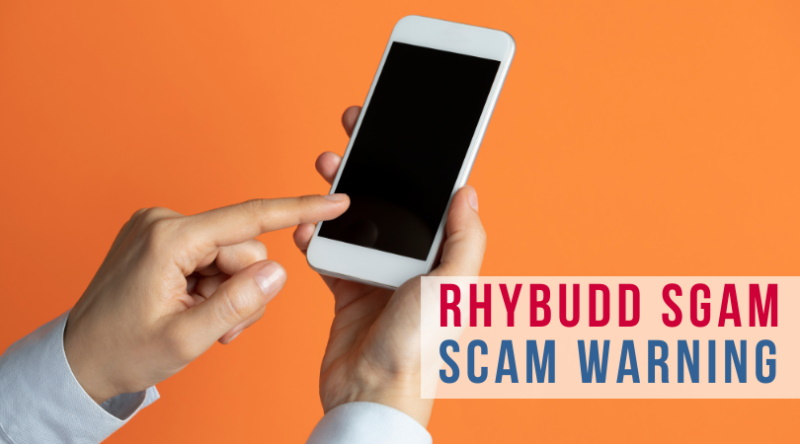
With this type of call, if ‘1’ is pressed, the scammer will attempt to gain as many personal details as possible from you, including your bank details.
These are smart criminals who know what they’re doing, and they will often appear genuine. If you receive a call like this, it’s best to hang up and either check your Tesco online account yourself, or call Tesco directly from a number you have obtained.
- You can help protect yourself from such scams by following this advice:
- Do not pass any personal or financial details to anyone who calls you out of the blue.
- Do not follow any links if the criminals text or email them through. These will take you to fake sites that are built to look authentic.
- Never accept or download any remote software to your computer that allows other people to access it.
- Do not sign into your bank account online if you have installed remote access software, otherwise there’s a good chance you’ll lose money.
- If someone on a cold call asks you to download a remote access app or access your bank account – end the call.
- If you have received a call like this, and you’ve accessed your account or transferred money – always contact your bank on the number on the back of your bank card. Never use a number you’re given by the caller.
Always remember to STOP-CHALLENGE-PROTECT
You can report any incidents where you’ve fallen victim to this type of fraud to us, either online HERE, by emailing 101@dyfed-powys.pnn.police.uk or by calling us on 101.
SCAM ALERT: CENSUS DAY IS COMING!
Households across the UK are currently receiving letters which include a unique 16-digit code to access the census online. Criminals may try to use this as opportunity to send phishing emails or texts.
Check out the advice below to stay safe

SCAM NHS COVID VACCINE EMAILS
Dyfed Powys Police Economic Crime Team have become aware of a new Covid Vaccine scam.
DC Gareth Jordan from the Cyber Crime Unit says that in the latest variant of the scam, the victim receives an email that they are on the Covid vaccination list and they need to select whether they do or don’t want the injection.
Either choice will take the victim to a site where they will be requested to enter personal / financial data such as bank account details, card numbers, Driving licence ID, on the pretext that the site is checking their validity. The site is doing exactly the opposite, it is taking their details so they can be used for in more direct ‘spear phishing’ or to utilise the details for ID Theft and also financial fraud.
Full details can be found by clicking HERE
ANOTHER AMAZON SCAM
The below ‘spoof’ invoice was sent to a member of DPP NARPO recently:
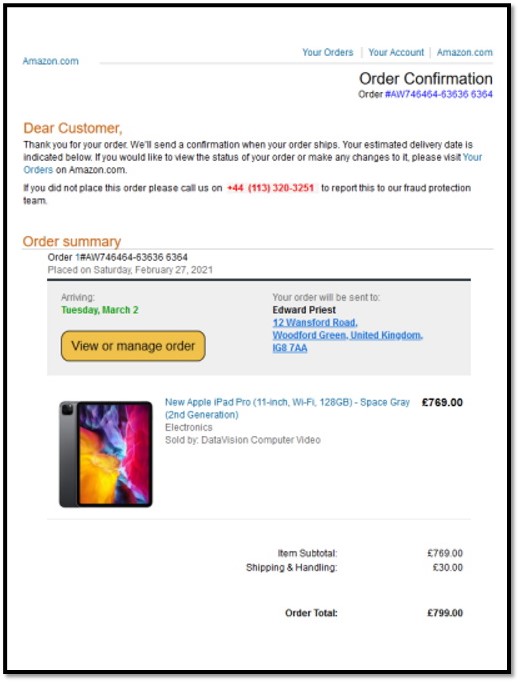
FRAUDSTERS WILL TRY EVERY TRICK IN THE BOOK TO GET YOU TO PART WITH YOUR HARD EARNED CASH
DON’T MAKE LIFE EASY FOR CRIMINALS - JUST REMEMBER:
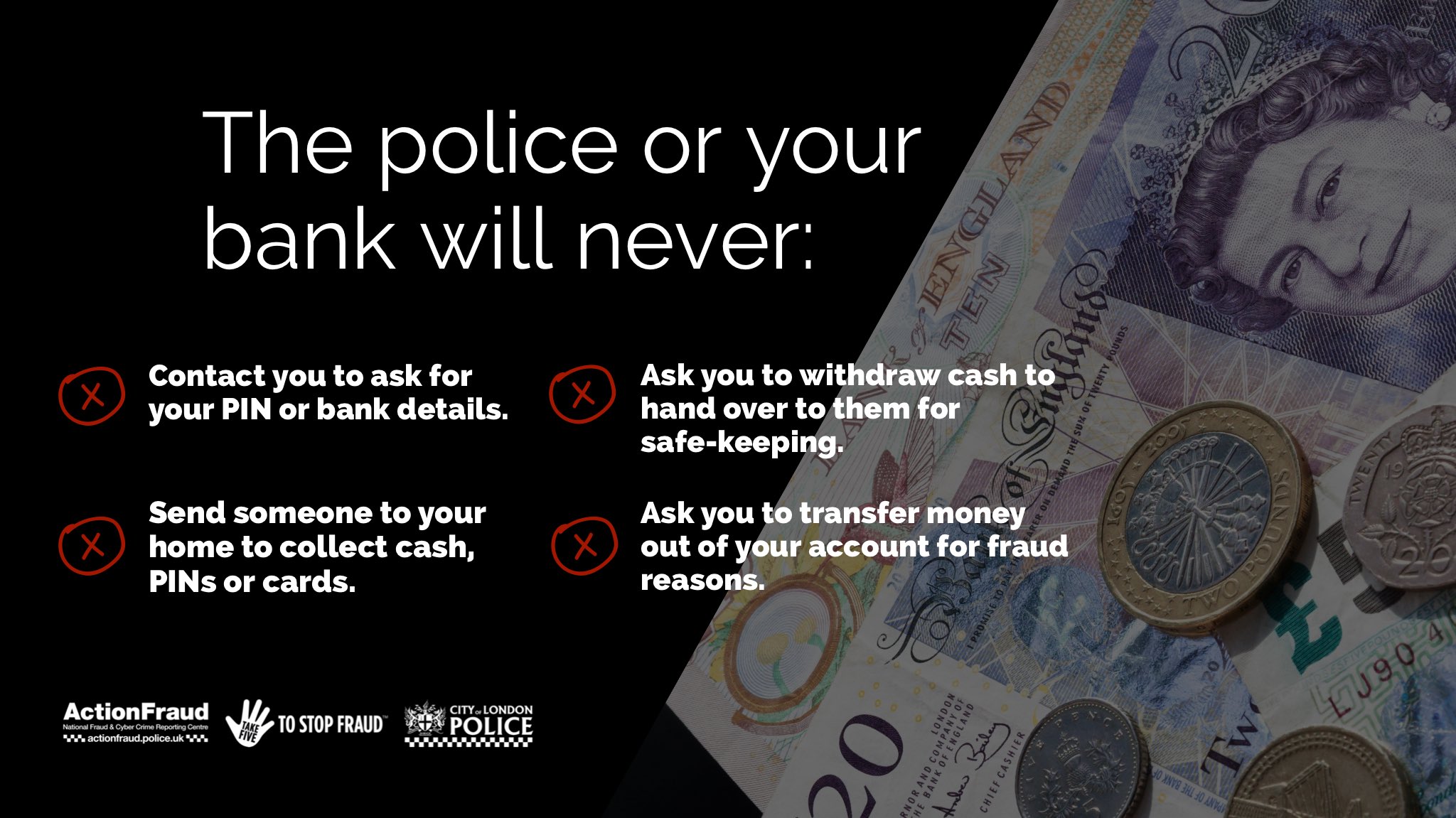
STAYING SAFE ONLINE QUICK LINKS
Getting online can make life easier in many ways, but also comes with the risk of scams and fraud.
Online scams are becoming increasingly sophisticated and many people are caught out, even those who are regular internet users - these links could prevent you from becoming a victim.

SCAM ALERT - BITCOIN INVESTMENT
Action Fraud is seeing a high number of reports about emails promoting Bitcoin investment scams.
Fraudsters are using images of celebrities to make the emails seem authentic but the celebrity has no knowledge of the scam and does not endorse it.
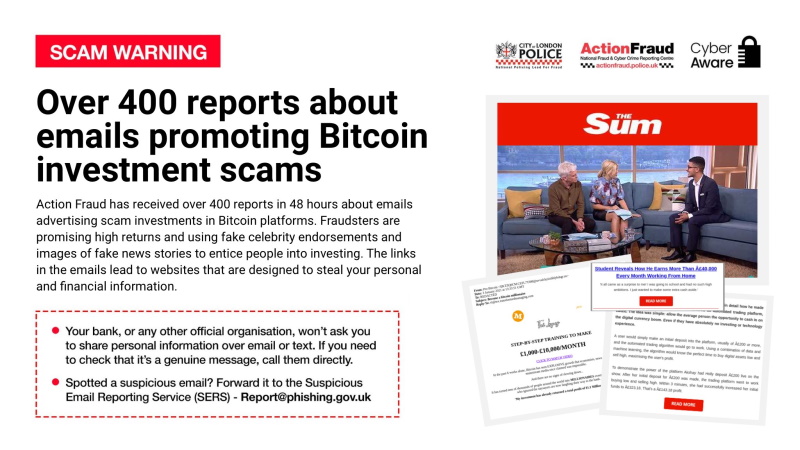
SCAM ALERT - AMAZON, HMRC, MICROSOFT AND MORE!
Criminals are trying to make it look like they are Amazon or similar companies calling. They state you owe money or unauthorised spending.
DON'T PRESS 1. JUST HANG UP…

SCAM ALERT - COURIER FRAUD
Dyfed-Powys Police Economic Crime Team have received reports that people are being contacted by fraudsters as part of a scam known as ‘Courier Fraud’.
Criminals call, pretending to be police officers, advising about fraudulent activity on your bank account or card.
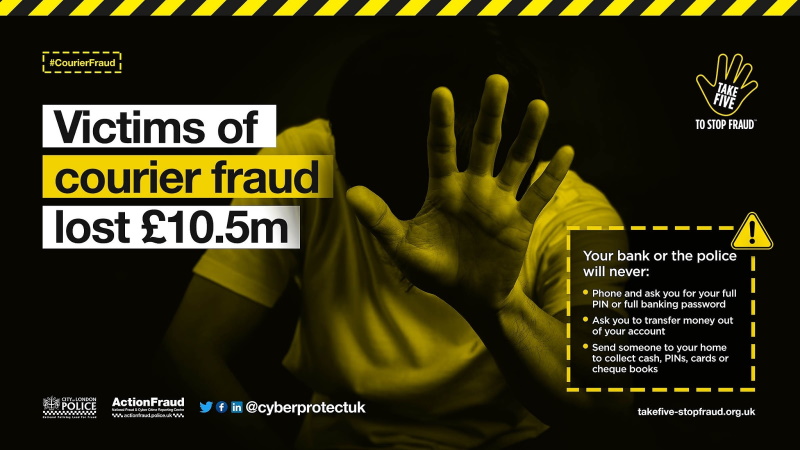
SCAM ALERT - COVID-19
The COVID-19 vaccine is free of charge on the NHS.
The NHS will NEVER ask for:
- Your bank account or card details
- Your pin or banking password
- Copies of personal documents to prove your identity such as your passport, driving licence, bills or pay slips.

SCAM ALERT - INVESTMENT FRAUD
Contacted out of the blue about an investment opportunity? This is a common tactic used by criminals.
Don’t be rushed into making an investment.

Remember: No legitimate organisation will pressure you into making a transaction or committing to something on the spot.
SCAM ALERT - FAKE FACEBOOK MESSAGE
If you receive a Facebook Message asking “Is that you”?
Do NOT click on the link Do NOT enter your Facebook User ID and Password.

SCAM ALERT - TAKE FIVE TO STOP AND CHALLENGE
Britain’s departure from the EU could allow criminals to target people with links to applications for fake EHIC cards & spoofed HMRC sites urging businesses trading with the EU to register for a "UK trade number".
Take a moment to #Stop and #Challenge any requests received.
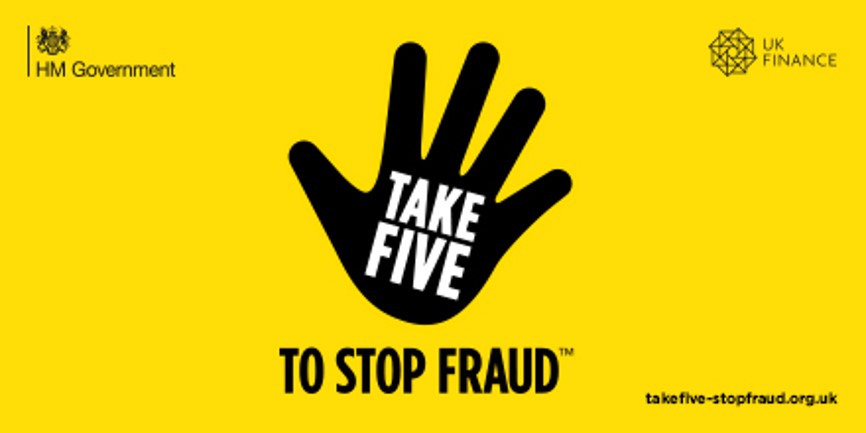
SCAM ALERT - COUNCIL TAX REFUND
There’s a fake GOV.UK email doing the rounds falsely claiming you’ve qualified for a council tax reduction due to the pandemic.
Here’s what it looks like:

The email uses GOV.UK branding and similar wording to government communications, as well as being disguised to appear as though it’s come from a legitimate GOV.UK email address.
Clicking the link takes you to a page that asks for your personal details – the scammers could then use these details to get access to your money.
SCAM ALERT - FROM NATWEST BANK
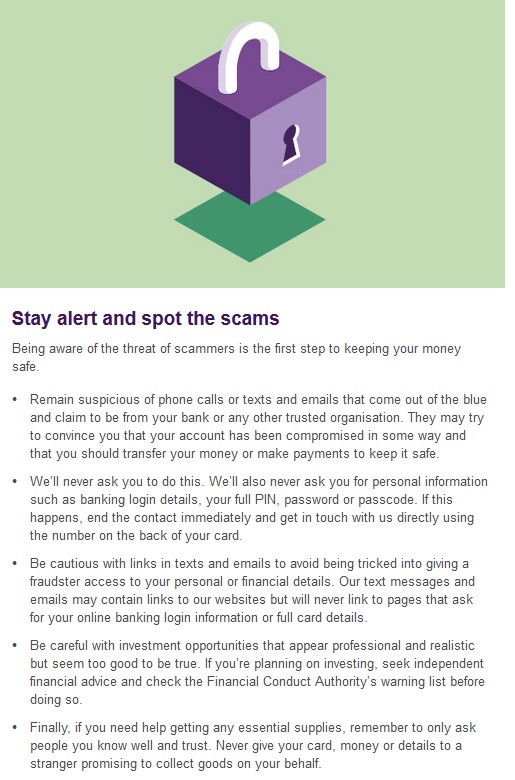
SCAM ALERT – FAKE EMAILS FROM ROYAL MAIL

SCAM ALERT – CALLS FROM DYFED-POWYS POLICE
We're asking the public to be vigilant in respect of any unexpected calls claiming to be from Dyfed-Powys Police.
A resident recently received a telephone call where the caller claimed to be a police officer from Dyfed-Powys Police, and that they were going to be arrested. The call was eventually terminated, but if it had gone on there would have inevitably been a demand for funds. Worryingly, the scammers had gone to great lengths to make it look like the call had come from the force – as the non-emergency number to call if you’re outside of the force area was displayed on the victim’s mobile when it rang– 01267 222020. The scam caller also stated that they were calling from a station local to the victim.
Please be aware that if an officer from Dyfed-Powys Police was genuinely trying to contact you via telephone, these 01267 numbers would not show up. Therefore, if you receive a call like this, please do not engage with the caller or carry out any actions they may ask you to do, and instead terminate the call as soon as you become suspicious.
SCAM ALERT - AMAZON PRIME TELEPHONE SCAM…
Have you received an automated telephone call claiming to be from Amazon Prime?
These calls are a scam! This scam has seen criminals steal over £1M from victims.
The call states that you have been charged for an Amazon Prime subscription and to ‘press 1 to speak to an operator’ to cancel.
However, pressing ‘1’ can connect your call to a criminal posing as an Amazon Prime member of staff.
There are variations of the scam, including being ‘owed a refund’ for a ‘fraud committed on your Amazon account’. All of which aim to gain your information.
Typically, the criminal will ask for your bank details, but in some cases they ask for direct access to your online device, giving various reasons why they need to do this.
To enable this access, they will ask you to install software onto your device. They may then ask you to login to your online banking.
Remember - if you receive an unexpected message by telephone, email or text:
- Verify the message using your own trusted method.
- Do not press ‘1 to speak to an operator’ or use contact information within the message.
- Go via your own trusted route to check with the company.
- Do not give out your personal or financial information.
- Do not click onto web links or attachments in the message.
- Protect your device and your data.
SCAM ALERT - PHISHING EMAIL ALERT
Message sent by: Action Fraud (Action Fraud, Administrator, National)
There is a phishing email currently in circulation that claims to be from the City of London Police. The departments that it claims to represent include the ‘Fraud Intelligence Unit’ and the ‘National Fraud Intelligence Bureau’. The email is titled ‘compensation fund’ and has a letter attachment that claims to be offering financial compensation to victims of fraud. The letter uses the City of London Police logo.
The letter states that in order for compensation to be arranged, the receiver of the email should reply disclosing personal information. It states that HSBC and the South African Reserve Bank have been chosen to handle the compensation claims. All of these claims are false. The email and letter are fraudulent and should not be replied to.
Protect Yourself:
• Opening attachments or clicking links contained within emails from unknown sources could result in your device being infected with malware or a virus.
• The City of London Police and the National Fraud Intelligence Bureau will never email you asking for you to disclose personal information.
• If you believe you have become a victim of this fraudulent email get your device checked by a professional and make a report to Action Fraud, the UK’s national fraud and cyber crime reporting centre: http://www.actionfraud.police.uk
SCAM ALERT - HM REVENUE & CUSTOMS PHONE SCAM
Dyfed-Powys Police has issued a warning to residents following numerous reports of a phone scam in Ceredigion and Powys over the last few days. Officers have received reports of someone purporting to be from the Her Majesty Revenue and Customs (HMRC) asking for money.
DC Gareth Jordan said: “It would appear that Ceredigion and Powys have been targeted with a phone scam and I am very keen to get the message out to the whole of our police force area that this is a scam as no doubt this will continue to spread throughout the area.
“It is probably a non-UK company carrying out these calls in an effort to phish details from the victim, and eventually get them to pay money stating that they owe taxes.
“The HMRC would never target people in this way and would certainly never ask for money or bank details over the phone.
“Please be vigilant, do not part with any money or personal information. Remember - It is OK not to speak with cold callers - just put the phone down. If you are concerned please contact police on 101.”
Fraudsters are contacting victims in three ways:
· Voicemails: Fraudsters are leaving victims automated voicemails saying that they owe HMRC unpaid taxes. When victims call back on the number provided, they are told that there is a warrant out in their name and if they don’t pay, the police will arrest them.
· Spoofed calls: Fraudsters are cold calling victims using a spoofed 0300 200 3300 number and convincing them that they owe unpaid tax to HMRC.
· Text messages: Fraudsters are sending text messages that require victims to urgently call back on the number provided. When victims call back, they are told that there is a case being built against them for an outstanding debt and they must pay immediately.
Top tips on how to avoid scams:
· HMRC would never use texts to tell you about a tax rebate or penalty or ever ask for payment in this way.
· Telephone numbers and text messages can easily be spoofed. You should never trust the number you see on your telephones display.
· If you receive a suspicious cold call, end it immediately.
· Do not enter into conversation with them, provide them with any personal details or send them any money
For further advice and information on how to avoid being scammed visit www.actionfraud.police.uk


